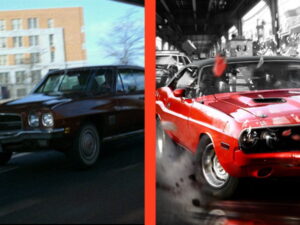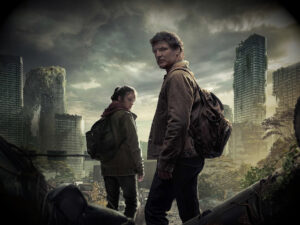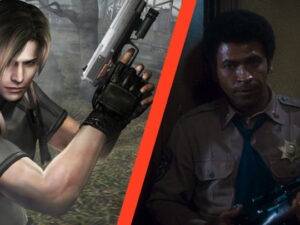Cut Scenes is Josh Wise’s regular examination of the intersection between video game and film. This time, it’s Haze and Starship Troopers.
Propaganda gets more than its due in games. Venture down into Rapture, the salty city of BioShock, and you will have it poured into your ears, like an alluring poison, straight from the mouth of its founder. The Last of Us is infested with the stuff, sprayed onto walls and papered across doors. You have to give credit to Haze, however, for coming up with a novel new dispersal method: directly into the bloodstream.
The crux of the game is that you play a soldier in a private military company, called Mantel Security. The perks of the job are as follows. One, you get to sort out the world and its attendant woes, gun in hand, via a fancy dropship. Two, you get a fetching uniform, with a honeycomb pattern on the shoulder and a visor of purest yellow. And three, you get as much Nova-Keto-Thyrazine – better known as Nectar – as you need. This marvellous gloop is the same glowing hue as your visor, and it’s pumped through you periodically, the better to insure that your sting stays intact. Reflexes, strength, and speed all get a boost, as does your ability to cleanly sort the world into black and white, wafting away those pesky ethical greys as though they were fumes. The bodies of your enemies glow through the foliage, and when they’re felled they seem to vanish. Problem solved. Plus, your irises take on a charming golden tint. What’s not to like?
“My name is Shane Carpenter,” our hero says. “I was born into a world of war. I was born into a world where unless someone makes things right, they’ll never be right. I was born in 2023.” Good luck to him. Shane and his fellow-troops are charged with freeing an oppressed people from the heel of a nasty dictator. “I am so ready to liberate some natives,” one of Shane’s comrades says, geeing himself up before the mission. Moments later, the men are juiced with Nectar; “Sure is better than coffee and a slap in the face,” says Duvall, the platoon’s leader. They are sent into the Boa region of South America, a tangle of steamy greens and men who race from the treeline to greet their liberators with small arms fire. How’s that for a slap in the face?
Compare the scene in Starship Troopers, in which Johnny Rico and his company discover an abandoned human outpost on Planet P, a dusty rock in the Klendathu System. After checking the place out, and finding a few mauled bodies, they are besieged by aliens. Or, at least, by a sea of scuttling brown. It’s only as they get near that you can make out the mandibles and scything limbs; but near isn’t where you would want to be. These creatures are clearly vicious, but the director, Paul Verhoeven, makes a point of muddying that clarity. It turns out that it was we colonising humans who boldly barged into Klendathu in the first place. These things may be keen to kill us, but that is only because they fear us.
In comes the propaganda! Johnny and the footsloggers of the Mobile Infantry are fed on a diet of choice information, trimmed and tapered to fit the narrative of the United Citizen Federation. They are schooled in the importance of enlisting in the armed forces – “Join the Mobile Infantry and save the world!” And the media is rife with messages of patriotic import: children stomping on bugs in the street, soldiers letting kids hold their rifles for a lark. When Johnny finds the body of a soldier, on Planet P, with a hole in his head and his brains sucked out, you wonder if Johnny and his pals back home hadn’t already suffered a similar fate.
Verhoeven is, of course, wise to the irony of the image. He has long thrived on the interlocking of machines and mortals – young men ground through the gears of the state, or shot to pieces and plugged into bodies of burnished metal. In Starship Troopers, as in many of his movies, Verhoeven takes pains to find humour in the blackest of places, often by finding the blackest humour in the sight of those taking pains. Watch as a couple of Johnny’s comrades are relieved of their heads by a flying bug the size of a horse; you almost expect them to just carry on shooting, given that they were hardly using their heads in the first place.
Likewise, the developers at Free Radical Design, stalwarts of the TimeSplitters games, have always had laughs on their minds. At first glance, Haze is a show of shocking and uncharacteristic joylessness: dark, stark, and stained by moral murkiness. But stay with it, and you notice the doses of humour – not quite injected into the game but, rather, oozing out – impossible to suppress. It’s there in the Mantel grunts, Watchstrap and Peshy, who register their excitement by slamming into each other like NFL players and shouting, “Boosh!” It’s even there, later on, as Shane switches sides with the Boa rebels and blasts his former colleagues; “This sure as shit beats pumping gas!” one of them says. Despite the propaganda of the time, with Call of Duty in full and dour swing, Free Radical was quietly defiant. Like Johnny Rico, Shane Carpenter may have been born into a world of war, but Free Radical makes things right. Boosh!












